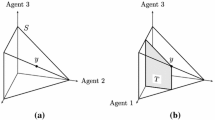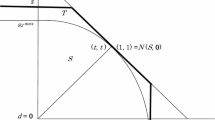Abstract
We analyze bargaining situations in which the feasible set is known but the disagreement point is uncertain. By requiring that all agents, generally, be affected by the uncertainty in the same way, we characterize thelexicographic egalitarian solution.
Zusammenfassung
Wir analysieren Verhandlungssituationen, in denen die Menge der erreichbaren Auszahlungen bekannt, der Drohpunkt jedoch unsicher ist. Durch die Forderung, daß, allgemein gesprochen, alle Spieler (Agenten) in derselben Weise von der vorherrschenden Unsicherheit betroffen sind, charakterisieren wird dielexikographisch egalitäre Lösung.
Similar content being viewed by others
References
Chun Y (1987) Axioms concerning uncertain disagreement points for 2-person bargaining problems. Discussion Paper No. 99, University of Rochester
Chun Y (1988) Nash solution and timing of bargaining. Economics Letters 28:27–31
Chun Y, Peters HJM (1989) Lexicographic monotone path solutions. OR Spektrum 11:43–47
Chun Y, Thomson W (1987) Bargaining with uncertain disagreement points. Discussion Paper No. 77, University of Rochester
Imai H (1983) Individual monotonicity and lexicographic maxmin solution. Econometrica 51: 389–401
Kalai E (1977) Proportional solutions to bargaining situations: interpersonal utility comparisons. Econometrica 45:1623–1630
Lensberg T (1982) The lexicographic maximin solution. Discussion Paper, Norwegian School of Economics and Business Administration, Bergen, Norway
Myerson RB (1981) Utilitarianism, egalitarianism, and the timing effect in social choice problems. Econometrica 49:883–897
Nash JF (1950) The bargaining problem. Econometrica 18:155–162
Perles MA, Maschler M (1981) The super-additive solution for the Nash bargaining game. International Journal of Game Theory 10:163–193
Peters HJM (1986) Simultaneity of issues and additivity in bargaining. Econometrica 54:153–169
Thomson W (1987) Monotonicity of bargaining solutions with respect to the disagreement point. Journal of Economic Theory 42:50–58
Thomson W (1988) Bargaining Theory: The Axiomatic Approach. University of Rochester Lecture Notes
Author information
Authors and Affiliations
Additional information
Discussions with Professors William Thomson and Hans Peters are gratefully acknowledged. However, I have full responsibility for any shortcomings.
Rights and permissions
About this article
Cite this article
Chun, Y. Lexicographic egalitarian solution and uncertainty in the disagreement point. ZOR - Methods and Models of Operations Research 33, 259–266 (1989). https://doi.org/10.1007/BF01423335
Received:
Published:
Issue Date:
DOI: https://doi.org/10.1007/BF01423335




